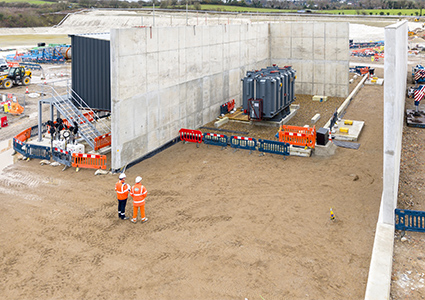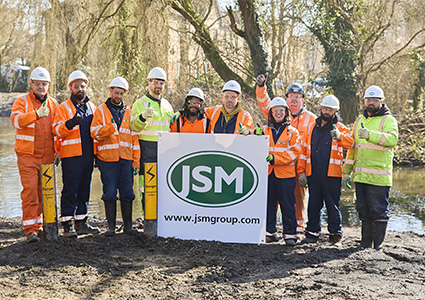JSM Group Services Ltd. works with clients to problem-solve and develop innovative, end-to-end utility infrastructure solutions
Established in London in 1998, JSM Group Services Ltd. is a leading provider of integrated utility infrastructure solutions. Its combination of end-to-end technical expertise, decades of industry experience, and unlimited fresh thinking make the group a trusted partner for the implementation of next-generation connectivity in energy and communications. Its focus is on building for tomorrow, by delivering every day for clients right across the UK, Europe and beyond.
JSM Group operates in four sectors: power, telecoms, gas, and multi utility. At the core of JSM Power is a dedicated team of experienced electrical engineers capable of providing a comprehensive turnkey service by working with clients to identify the optimum solution at concept design stage and onwards through construction to energisation and project completion.
 JSM Telecoms combines the expertise of experienced telecoms managers with highly qualified engineers and civils teams, all with a proven ability to deliver telecoms infrastructure projects of varying complexity. The team prides itself on offering solutions adapted to the most complex fibre network requirements. Whether a major project, a network expansion, a customer connection, a PIA installation or maintenance and repair of the networks, JSM Telecoms has the in-house expertise to deliver these for clients.
JSM Telecoms combines the expertise of experienced telecoms managers with highly qualified engineers and civils teams, all with a proven ability to deliver telecoms infrastructure projects of varying complexity. The team prides itself on offering solutions adapted to the most complex fibre network requirements. Whether a major project, a network expansion, a customer connection, a PIA installation or maintenance and repair of the networks, JSM Telecoms has the in-house expertise to deliver these for clients.
Fully committed to the gas demands of the present day, with new installations and diversion works across a variety of gas verticals, JSM Gas is proactively aware of the ever-changing world in which we live, and the effects utility consumption impose on the planet. As such, it is excited to be part of the journey to a fossil free future.
Lastly, JSM Multi Utility is a one-stop shop with experience in difficult urban environments and the capability to deliver projects with a high degree of complexity. The division has successfully completed multi utility projects in highly congested and challenging areas including in Central London. Successfully delivering a multi utility project requires a high degree of coordination at both the planning and delivery stages. JSM Multi Utility’s strong relationships with the highways authorities and utility asset owners gives it a distinct competitive advantage and brings significant added value for clients.
“We are proud to be working with our private equity stakeholders,” shares Stephen Evans-Howe, SHEQ Director. “The experience and expertise they bring has helped accelerate our growth, but importantly, has done so without diluting our founder-led approach and the values that have served JSM well throughout its history. We continue to work with our clients as a trusted partner to problem-solve and develop innovative, end-to-end solutions.”
Innovative technology systems
This approach remains true as the company explores additional markets. Smart technologies, such as the cloud and AI for example, are all driving demand for data centres. As such, the role of the independent sector is critical for ensuring that all appropriate utility provisions are in place for both energy and communications. JSM has recently spoken at industry events on data centres being classified as Critical National Infrastructure and the challenge around getting them connected due to grid constraints. “We’re well placed,” Stephen shares, “primarily due to industry experience and our innovative approach, to deliver optimum solutions for data centres. A prime example of this is our experience in Hollowcore fibre installation.
“At JSM, we have an innovation working group, made up of a diverse range of employees and skillsets including engineers, estimators and designers. The group is led by John Fitzgerald, who is the mastermind behind NICE®. We also maintain a presence at industry events to ensure we’re up to date with what’s happening across our industries and those impacting it. NICE® (non-intrusive cable extraction) is a two-pit cable extraction tool that reduces environmental impact, minimises social disruption and delivers at cost neutral. It is a method for removing direct buried underground decommissioned fluid filled cables without the need for traditional open-cut trenching for the entire length of the cable. This mitigates the environmental risk of leaving the decommissioned cables buried. NICE® has been fully developed by JSM and is patented worldwide.”

Alongside such award-winning systems, JSM has a reputation for delivering right, first time. Given the critical nature of some of the infrastructure the company designs, installs, and maintains, the performance of its supply chain is paramount. “A significant number of our supply chain partners have long-standing relationships with JSM,” Stephen shares. “They fully understand our approach and have grown with us. These close relationships ensure mutual trust and respect, meaning issues are identified early and addressed in a swift and pragmatic way.
Positive impact
“We continually review the performance of our supply chain and are always seeking to move things forward. In recent years we’ve been focusing on understanding the environmental impact of our supply chain, with a focus on carbon reporting. We look forward to discussing this more in our first Environment, Social & Governance (ESG) Report due early in 2026, where we will map our improvement approach as we work towards Net Zero.”
Indeed, JSM’s goal is to minimise its impact on the environment and communities in which it operates. “JSM aims to champion knowledge, skills and behaviours that enable our workforce to do the right thing and ensure robust governance and risk management to pursue a harm free future,” he elaborates. “In support of this goal, we have launched our ESG roadmap for 2025 and are developing a longer-term strategy to be published in 2026.
“JSM recognises the moral imperative to act in a sustainable way but also sees the tangible business benefits of linking this activity to reducing business risk and improving operational efficiency. Our current measures incorporate carbon, waste, biodiversity, social value and our Health, Safety and Wellbeing program. In terms of carbon, we strive to minimise our direct and indirect energy and fuel use and understand the impact of our supply chain.
“Likewise, JSM is working toward recycling 100 per cent of its waste. We are currently investing efforts in moving up the waste hierarchy, working with operations and community groups to expand our re-use opportunities.
“A key part of our project planning services includes ecology and biodiversity assessment and management to mitigate any impact,” Stephen continues. “As well as supporting clients in this space, our operational projects provide the opportunity to support biodiversity initiatives, including bird and bat nest boxes, as well as employee volunteering initiatives, such as recent work undertaken with the Ealing Beaver project.”
Working with the communities where it operates re-enforces JSM’s local reputation. In addition to adding real social value, this supports business objectives and tackles skills shortages through employment opportunities for ex-forces and other groups who may find it hard to return to or enter the world of work.
Optimising operations
While JSM sees its historically strong health and safety performance as a differentiator for clients, the company recognises the need to continually evolve in this space, beyond robust management systems, employee competency and good governance. “In 2025,” Stephen adds, “we launched a revised human factors-based approach to Safety, Health, Environment & Quality (SHEQ), drawing on lessons from high-risk sectors such as aviation and defence. This new approach recognises we are all human, and everyone has an important role to play. Championing our values and associated behaviours we are challenging the team to ‘look out for ourselves’, by avoiding auto pilot, being aware of our surroundings and being conscious and intentional about our actions. We strive to ‘look out for others’ by engaging and encouraging them to succeed, and to ‘fix the system’ by changing the operation or work environment to better influence behaviours.
“Whilst this is a SHEQ driven initiative, the behaviours it will drive will inevitably improve our efficiency and flexibility along with our ability to adapt and improve all aspects of our business to support our clients.”
Looking to the future, Stephen shares the vision and strategy for the years ahead. “We have entities across Europe and the Middle East to meet our clients’ demand and will continue to assess the viability of projects against our geographically transferrable skills and deliver accordingly. Utilities is an exciting space currently, and this is largely being driven by the digital revolution we’re seeing with AI. We will continue to upskill, innovate, and challenge our capabilities to maintain being the utilities infrastructure provider of choice, continuing to grow as time moves on.
“JSM has always been innovative, so as you might expect, we are investigating how we optimise our business with the latest digital technology and artificial intelligence. Our Business Transformation team is exploring and investing in a variety of projects that will enable digital interfaces with our clients to improve efficiency and communication flows, real time data analytics to inform decision making and use of AI tools to reduce manual processing and provide insights. Thereby, enabling our human resource to focus on higher level activity,” he concludes.
